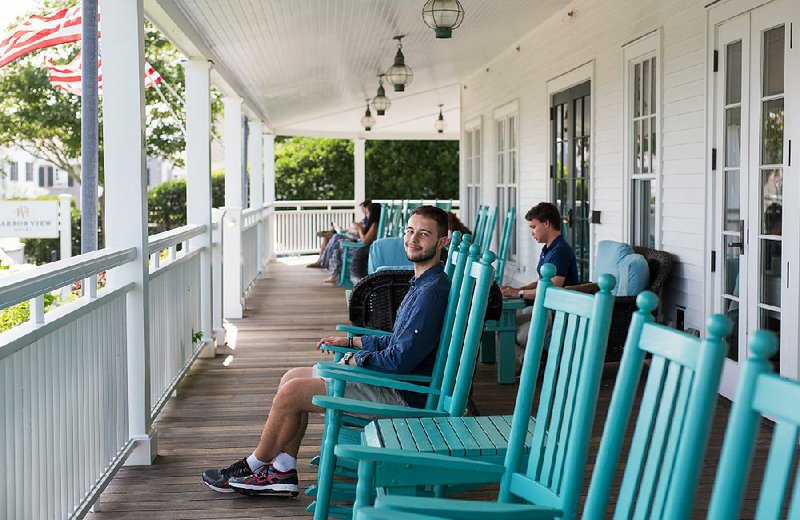MARTHA'S VINEYARD, Mass. -- As dusk settled over Edgartown on a recent evening, its dining rooms filled with vacationers, their silverware sliding through spreads of fresh lobster. Outside, hundreds more absorbed the ocean view, ambling past cottages draped in freshly laundered flags.
Weaving through the crowd at an altogether faster pace, 21-year-old Timofti Flaviu surveyed the scene. Back home in Romania, the recruiter had sold this as a summer of authentic American culture. As he scurried across town to a second job, the scene felt disappointing.
"They sold us a dream, but I didn't imagine it like this. Everything is clean and artificial," he says, glancing at the gleaming white slats of a nearby porch. "It's not like a real town at all. This place has no history."
Nestled in the Atlantic, a helicopter hop south of Cape Cod, Martha's Vineyard has a reputation for being a summer playground for America's liberal elite. Like the Clintons before them, the Obamas have been frequent guests and are currently there for a final White House vacation, tailed by a legion of staff and security members, and reporters, waiting on their every move.
Equally crucial are people like Flaviu, one of hundreds of eastern European workers who arrive to keep the island running smoothly. Arriving under the State Department's J-1 visa program, college students work for up to three months in resorts and vacation spots across the country. This laborers' army, almost 95,000-strong last year, is eight months in the making: Applications begin the previous October. Jobs in Hawaii and California are snapped up within days.
Many travel with American Experience, a company promising students a working summer of self-improvement, "crossing the ocean that splits you from yourself."
On Martha's Vineyard, they make the beds, stir fudge and wash the dishes. "It's the work Americans don't want," Flaviu says. "We'll do the lifting, take the overtime work, anything to make the trip worth it." It's a common take among the students there. And privately, many local employers agree: "We certainly don't see our countrymen doing so much overtime," said one.
For the price of about $1,000, students are guaranteed sponsorship and a job. Most will work two shifts: the first to cover housing and basic expenses on an island of privilege, the second to build savings, or to repay debts. Each shift typically lasts about five hours and pays at least minimum wage. Work above 40 hours is optional and paid at a higher overtime rate, and is rarely turned down.
As Flaviu scrambled through the crowded street, others were piling onto buses in time for their second jobs. "In our country, we don't earn in a month what people here can make in a week. I'm here to save as much as I can and to bring that back to my parents and build a life," he says. As a teacher of almost 30 years, Flaviu's mother will earn just $500 a month. As a bed-maker and cashier, he could earn thousands.
Ralston Francis, the owner of the Edgartown Diner, describes the program as a "win-win for everyone."
"We need workers, and they want the experience," he says, adding: "For the most part, everybody's happy."
He admits problems can arise if his new staff members struggle with English. In one up-market restaurant, a manager said drunken guests can grow short-tempered with the more-inexperienced workers. "You do see resentment if things don't flow perfectly," the manager said.
Reasons for signing on vary. For 19-year-old Maria Mileva from Bulgaria, it's tuition fees. Her journalism degree at a private university in Sofia costs four times the price of a state education, "but it's the best place to study," she said.
For Tea Nedeljkovic, 23, a German literature major from Serbia, Martha's Vineyard is a school of life with a playground attached. At the end of a 12-hour workday, the bars of Oak Bluffs are still going strong. Parties abound, and some students look for summer romance. "It's a lot of fun," Nedeljkovic says with a smile.
The young women work mornings in the local bookshop, selling beach reads and thrillers. Presidential biographies also fly off the shelves, betraying the interests of a crowd that, on the surface at least, dismisses any Obama fever as gauche.
The first family's vacation is leaving barely a footprint, unfolding mostly on the golf course or a private beach. When the president dined in Edgartown's L'Etoile restaurant recently, the crowd caught only a glimpse of his exit, cheering wildly as his motorcade whipped out of a side street and into the night.
That didn't bother the workers much. Few had heard of the island -- "We call it 'Martha's Not-a-Vineyard,'" one of them joked -- before signing up, and the hours are so long that interest in the president quickly wanes.
They were warned to expect culture shock. Americans prize independence and a healthy sense of competition, recruiters tell them. If homesickness appears, they're told to take a walk and focus on the here and now, and that the feeling will fade.
For the most part, it does. This is Nedeljkovic's second summer on the Vineyard, and she's finally getting used to American manners. "They teach us to greet everyone and ask how they are. It takes a while to learn that isn't a question," she laughs. "These customs are a bit strange for us, but they make a nice change. It's hard work here, but it's worth it."
Sleep is a luxury. The students keep irregular hours, and even an early night is easily disrupted in dormitories managed by their employers, where young men and women sleep six to a room.
Hotel beds are going for $500 a night, and a two-course meal can slip into three figures without breaching the wine list. The Edgartown dormitories begin at $125 a week, absorbing most of a first job's monthly pay, and come with few frills.
Leaving her room to begin another day's work, Diana Novac, 22, says it's "just a place to lay your head."
Novac is also a Vineyard returnee, traveling from her home in the west Romanian city of Timisoara for the second year. "When you arrive here the first time, you hate it. The work is hard, and you want to go home. But slowly you learn to love the freedom, and you can't imagine leaving that sunset." Her favorite is watched from Menemsha, a small fishing village cloaked in red as the sun slips below the ocean.
For Flaviu, the American experience has taught him something more fundamental: the importance of a home. "In these three months, I've learned where my home really is," he says, surveying the stream of tanned and smiling strollers. "Your country is your country, and you cannot change that."
SundayMonday on 08/21/2016

